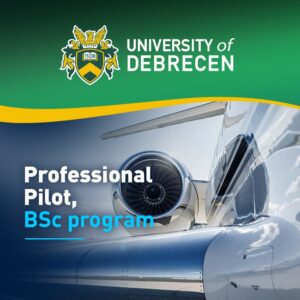Professional Pilot, BSc
Academic discipline: Engineering Science
Qualification: Professional Pilot
Starting date: September
Language requirements: English IELTS 6.0 or equivalent
Academic requirements: 12 years of education with grades 80% or above, or grades BBB at A level including mathematics and physics + entrance exam in mathematics and physics; health: valid Class 1 Medical Certificate (see on EASA website)
Duration: 7 semesters
ECTS credits: 210
Tuition Fee: 35,000 USD/year
One time fees: application fee 150 USD, entrance procedure fee 350 USD
Short description:
The main objective of the program is to provide applicants with knowledge and skills that enable the passing of the ATPL (Airline Transport Pilot Licence) theoretical knowledge examination and CPL(A), ME/IR(A) skill tests of the Hungarian Aviation Authority by fulfilling all requirements of the Authority with out any further education. To train professionals who understand the aviation industry, are capable of working for aircraft operator companies as professional pilots, are aware of the tasks related to air operation, ground handling and air transportation can perform adequate compliance tasks and possess the knowledge related to the integrated ATP(A) training.
The program includes:
- Theoretical part: 52 courses including several engineering and aeronautical subjects,
- Practical part: 8 courses including Integrated ATP(A) course with a total of 200 hours (140 flight and 60 simulator hours) and Type Rating course or Airline Pilot Standards Multi-Crew Cooperation course (more than 50 hours in Airbus A320 simulators).
Our students acquire:
- Bachelor’s degree,
- CPL (Commercial Pilot Licence),
- ME/IR (Multi-Engine/Instrument Rating),
- MEP CR (Multi-Engine Piston Class Rating),
- In addition:
- ATPL theoretical knowledge exam certificate,
- MCC (Multi-Crew Cooperation Training) course completion certificate,
- NVFR licence endorsement,
- UPRT (Upset Prevention and Recovery Training) course completion certificate and logbook endorsement,
- Type-rating course completion certificate or APS MCC (Airline Pilot Standard Multi-Crew Cooperation Training) course completion certificate (both trainings are conducted in Airbus A320 environment).
Core modules:
- Basics of Natural Sciences (Mathematics, Technical Mechanics, Engineering Physics, Thermodynamics and Fluid Mechanics, Informatics, Descriptive Geometry, Meteorology, Human performance and limitations)
- Economics and Humanities (Economics for Engineers, Microeconomics, Management for Engineers, Quality and Technical Management, Environmental protection, Dangerous Goods, Aviation Terminology)
- Professional Compulsory Subjects (Informatics for Engineers, Aircraft Technology, Mechanical Machines and Machine Elements, Materials Engineering, Manufacturing Technologies, Technique of Measurement, Environment, Health and Safety, Ergonomics (Basics of EHS), Mechatronic Devices (Sensors, Actuators, Motors), Basics of Aviation, Aircraft General Knowledge (Airframe, Systems, Power Plants and Instrumentation), Air Law, Human Performance, Meteorology, General Navigation, Radio Navigation, Communications)
- Field-specific Vocational Subjects (Mass and Balance, Performance, Flight Planning and Monitoring, Operational Procedures)
- Modules (Airline Pilot Standards Multi-Crew Cooperation course including Jet Orientation training; Type Rating course)
Lecture, seminar: 40%
Practice: 60%
PHARMAFLIGHT Aviation Academy Ltd.
The outsourced department of University of Debrecen called Aeronautical Engineering is located in PHARMAFLIGHT International Science and Service Center, right next to Debrecen International Airport. PHARMAFLIGHT Aviation Academy Ltd. ATO (Approved Training Organization) is an EASA approved training organization that complies with European Union legislation. Students complete the training on a Cessna 172, Tecnam P2008JC and P2006T aircraft together with FNPT II and FFS simulators.
Internship, practice: Professional Pilot BSc students have to complete three summer internships lasting 8 weeks each.
Career prospects: Those who pursue this degree program will be able to fly an aircraft in civil aviation, hold a management position in a department (e.g. flight operations, ground operations, flight safety, or compliance manager) after further training and considerable amount of practice or manage flights as an instrument-rated commercial pilot (with commercial pilot licence/instrument rating, CPL/IR) in accordance with aviation regulations and rules of the air. The degree offers the opportunity to advance to master’s level study.

